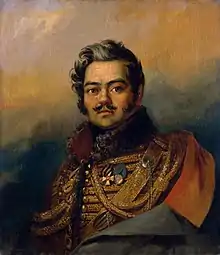Denis Davydov
Denis Vasilyevich Davydov (Russian: Дени́с Васи́льевич Давы́дов, IPA: [dʲɪˈnʲis vɐˈsʲilʲjɪvʲɪtɕ dɐˈvɨdəf] (![]() listen); 27 July [O.S. 16 July] 1784 – 4 May [O.S. 22 April] 1839) was a Russian soldier-poet of the Napoleonic Wars who invented the genre of hussar poetry, characterised by hedonism and bravado. He used events from his own life to illustrate such poetry.
listen); 27 July [O.S. 16 July] 1784 – 4 May [O.S. 22 April] 1839) was a Russian soldier-poet of the Napoleonic Wars who invented the genre of hussar poetry, characterised by hedonism and bravado. He used events from his own life to illustrate such poetry.
Denis Davydov | |
|---|---|
 Portrait by George Dawe | |
| Born | 27 July 1784 Moscow, Russia |
| Died | 4 May 1839 (aged 54) Simbirsk Governorate, Russia |
| Known for | Hussar poetry |
| Signature | |
Biography
Davydov stemmed from a family of Russian nobility with Tatar roots.[1][2] After gaining celebrity as a guerrilla leader in the Russian Patriotic War, he became one of the most popular men in the country. Young men of Pushkin's circle viewed him as a model romantic hero and the Decembrists prized his company as well.
Davydov's poems were admired by Vissarion Belinsky for their organic quality and "Russianness". Alexander Pushkin had a high opinion of his poetry and said that Davydov had showed him the way to be original.[3] His poems address such themes as courage in battle, harlots, vodka, and the value of true friendship. In them he sings the praise of reckless valor, on the field of battle as well as before the bottle. His later poems were inspired by a late love for a very young girl.
The diction in some of his poems is considered unconventional, and occasionally his words have to be replaced by dots,. Besides hussar poetry, his works included the anti-absolutism poem 'Head and Feet'. He wrote an Essay towards a Theory of Guerilla Warfare (1821) and Some events from the life of Denis Vasilievich Davydov, a series of recollections on military life, used by Leo Tolstoy in writing War and Peace. According to D.S. Mirsky, "in his autobiography he indulges in a veritable orgy of puns and jokes not always in the best of taste. His military writings are fresh, vigorous, and racy; and his memoirs contain some of the best military reading in the language".[4]
Davydov fought in the Russo-Iranian War of 1826-1828.[5] His grave, with his statue above it, is situated next to the exit door of the katholikon of the Novodevichy Convent.
Other

A Boeing 777-300ER operated by Russia's national airline Aeroflot is named "D. Davydov" as part of a tradition in naming their fleet after historical Russian figures. The name is printed as part of the aircraft's nose art.
In the 20th and 21st century, at least 4 ships associated with the name of D. Davydov as an object of intangible heritage.[6]
References
 This article incorporates text from D.S. Mirsky's "A History of Russian Literature" (1926-27), a publication now in the public domain.
This article incorporates text from D.S. Mirsky's "A History of Russian Literature" (1926-27), a publication now in the public domain.
- Sara Dickinson, Breaking Ground: Travel and National Culture in Russia from Peter I to the Era of Pushkin, Rodopi (2006), p. 164.
- Stefan Berger & Alexei Miller, Nationalizing Empires, Central European University Press (2015), p. 312.
- Mirsky, p. 82.
- Mirsky, p. 118.
- Avery, Hambly & Melville 1991, p. 337.
- Patriotic War of 1812 about the liberation campaigns of the Russian Army of 1813-1814. Sources. Monuments. Problems. Materials of the XXIII International Scientific Conference, 3–5 September 2019. Borodino, 2020. // S. Yu. Rychkov. The historical memory about the participants of the Borodino battle in the names of ships. PP.302-329.
Sources
- Avery, Peter; Hambly, Gavin; Melville, Charles, eds. (1991). The Cambridge History of Iran (Vol. 7). Cambridge University Press. ISBN 978-0521200950.CS1 maint: ref=harv (link)
Further reading
- Books by Davydov